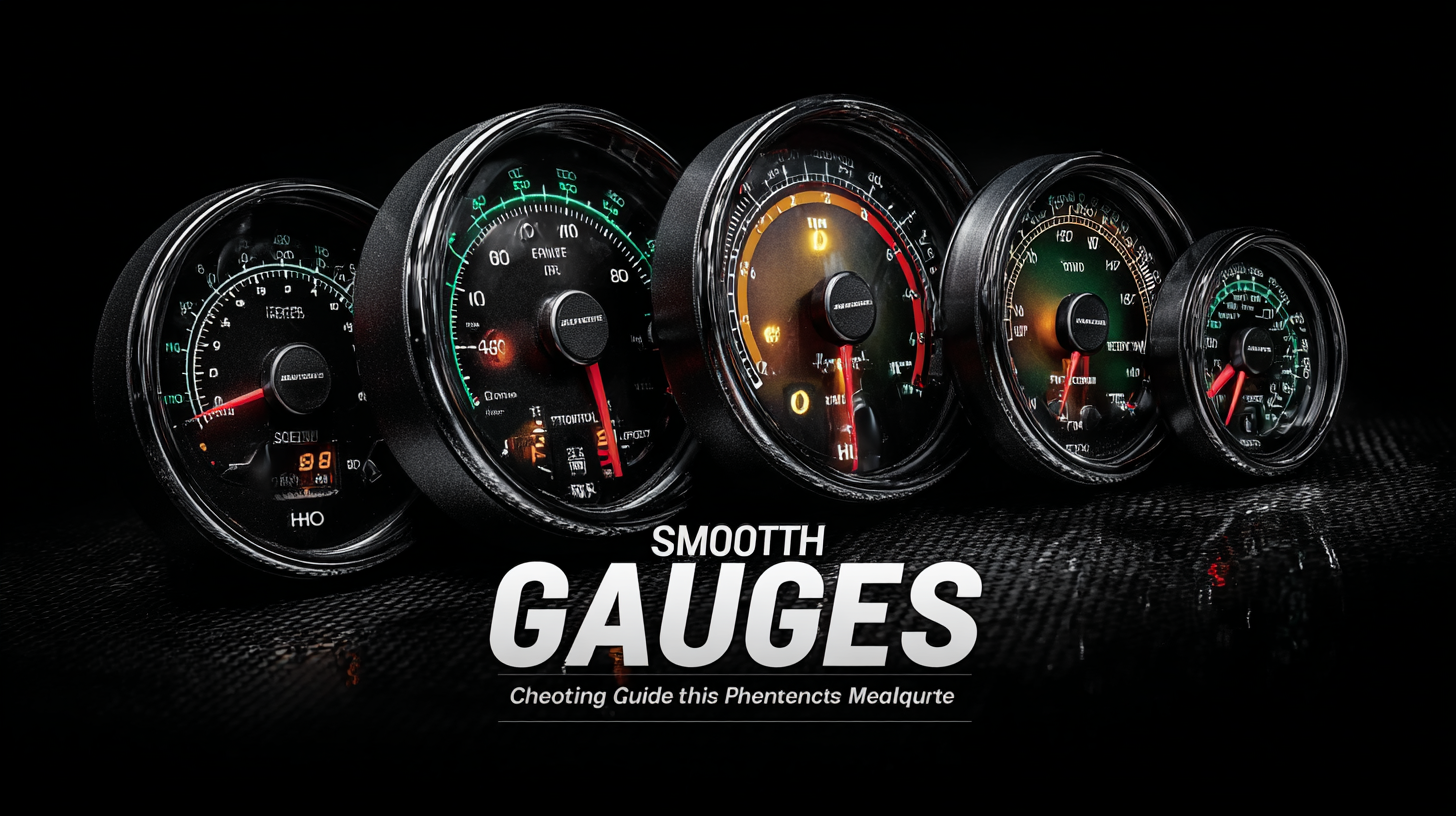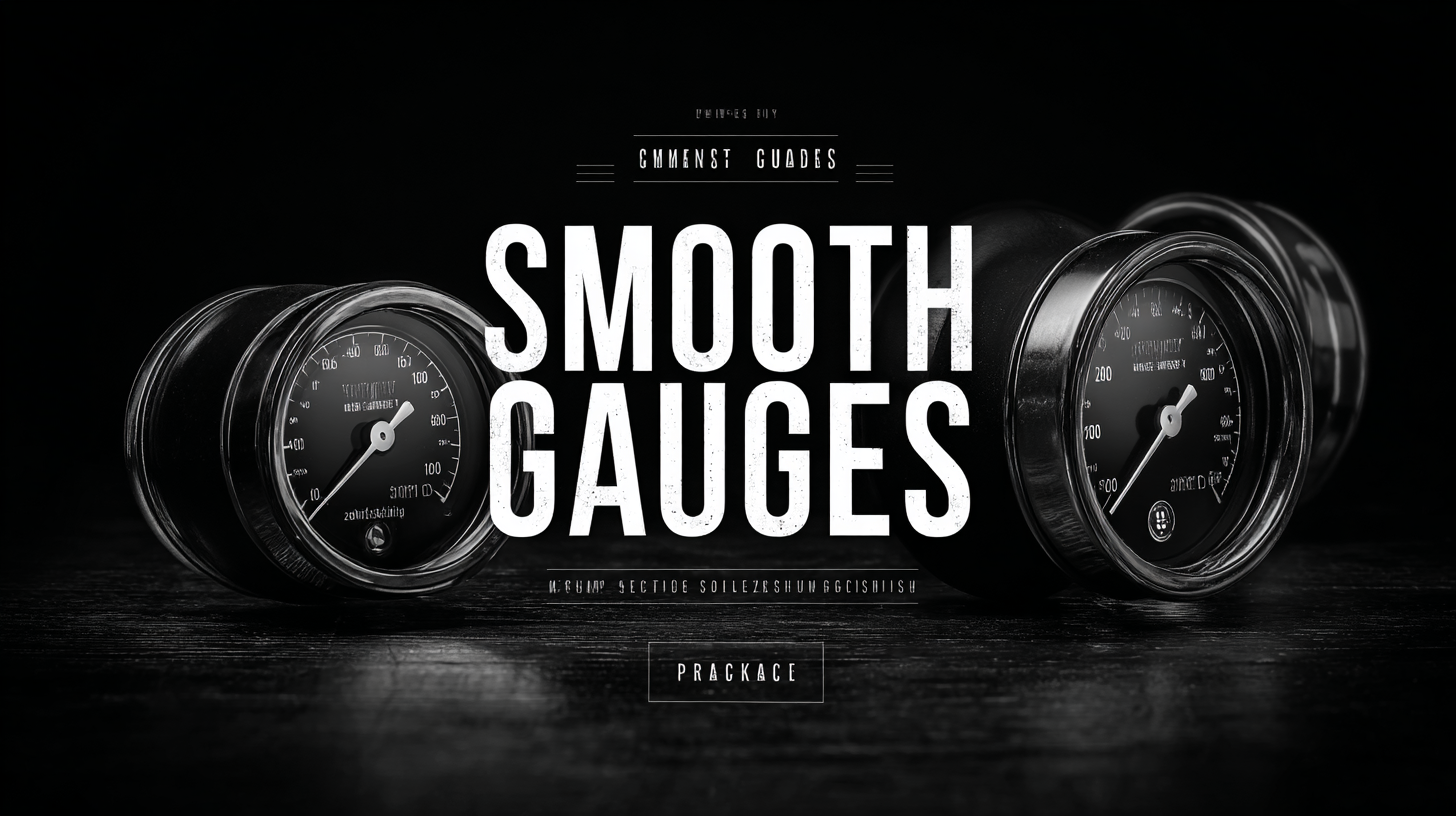
In today's precision-driven manufacturing landscape, the selection of the right measurement tools is crucial for ensuring product quality and compliance with industry standards. Among these tools, Smooth Gauges have emerged as a vital component, gaining recognition for their ability to deliver accurate and reliable measurements across a variety of applications. According to a recent report by Grand View Research, the global precision measurement market is expected to reach USD 11.9 billion by 2025, highlighting the growing importance of precision tools like Smooth Gauges in industries such as aerospace, automotive, and medical. This guide aims to delve into the key factors to consider when choosing Smooth Gauges, focusing on their certifications, performance metrics, and best practices that can enhance the efficiency of your measurement processes while ensuring compliance with international quality standards.

Smooth gauges play a crucial role in achieving precision measurement across various industries, particularly in manufacturing and engineering. What sets them apart from traditional measuring tools is their design and functional capabilities, which allow for enhanced accuracy and reliability. Unlike other gauges that may rely on profiles or other complex measurement techniques, smooth gauges are engineered to provide a seamless surface contact, leading to consistent and repeatable measurement results. This feature is essential when measuring components that require tight tolerances, as even minor discrepancies can result in significant issues during production.
The materials used in the construction of smooth gauges also contribute to their effectiveness. Typically crafted from high-quality steel or carbide, these gauges are designed to withstand wear and tear, maintaining their precision longevity. Furthermore, the finishing processes often involve meticulous polishing, ensuring that the gauge surface is devoid of imperfections that could affect measurements. Such attention to detail not only enhances the gauge's performance but also extends its lifespan. As precision measurement continues to advance and evolve, understanding the unique attributes of smooth gauges will help professionals make informed decisions when selecting the ideal tools for their specific measurement needs.
When selecting smooth gauges for precision measurement, several key factors must be considered to ensure accuracy and reliability in your applications. First and foremost is the material of the gauge. Gauges made from high-carbon steel, for instance, are often favored for their durability and resistance to wear, making them ideal for environments that involve frequent use. Additionally, the gauge's tolerance levels are crucial; industry standards suggest that a tolerance of ±0.001 inches is acceptable for most industrial applications, while tighter tolerances may be required for precision engineering tasks.
Tip: Always choose gauges that match the specific measurement range of your application to ensure optimal performance and accuracy.
Another important consideration is the design of the gauge. Smooth gauges should have a polished finish to minimize friction and improve measurement consistency. According to a 2020 market report from the Precision Measurement Industry, products with enhanced surface finishes can result in a measurement accuracy improvement of up to 20%. It is also imperative to consider the gauge's calibration history; gauges that are regularly calibrated and certified comply with ISO standards, which greatly enhances their reliability.
Tip: Keep detailed records of gauge calibration and use to facilitate better maintenance and compliance with industry regulations.
In today's manufacturing landscape, precision measurement is paramount, and smooth gauges play a crucial role in ensuring accuracy and consistency. The integration of advanced technology into the design and functionality of these gauges has revolutionized their performance and reliability. Gone are the days of solely relying on mechanical systems; now, digital enhancements and smart technologies enable smoother operation and more precise readings.
Innovations such as digital displays and wireless connectivity have made it easier for operators to obtain real-time data, minimizing human error and improving efficiency. Furthermore, the use of software algorithms allows for complex data analysis, enabling manufacturers to identify trends and make informed decisions on production processes. The adoption of materials with superior properties, combined with smart technologies, ensures that smooth gauges not only meet but often exceed industry standards, leading to better overall product quality.

As we delve into the market trends and predictions for smooth gauges by 2025, it's essential to consider the broader context of measurement technology within various industries. A recent report highlights that the resolver market is projected to grow significantly, with its size and share expanding through 2033. Specifically, the market is being driven by applications in automotive, industrial machinery, and aerospace sectors, showcasing an upward trend in demand for precision measurement tools.
By examining the anticipated growth in related segments, such as the global pulp and paper machinery market, which is expected to increase from $117.91 billion in 2025 to $154.05 billion by 2032, we see a parallel emergence in the smooth gauges market. The overall annual growth rate for this segment is estimated at 3.9%, reflecting a robust appetite for precision and consistency in manufacturing processes. As industries continue to innovate and demand more accurate measurements, the choice of smooth gauges will be pivotal in meeting these emerging challenges, ensuring high-quality outcomes across various applications.
When selecting smooth gauges for precision measurement, it's essential to consider the leading brands and their unique features. Prominent names like Starrett, Mitutoyo, and Brown & Sharpe stand out in the industry for their commitment to accuracy and user-friendly designs. Starrett gauges, known for their durability and precision, offer a range of models that cater to various measurement needs, from simple tasks to complex industrial applications. Their smooth surfaces allow for easy insertion and measurement, minimizing the risk of damage to both the gauge and the workpiece.
Mitutoyo, on the other hand, combines advanced technology with traditional craftsmanship. Their digital smooth gauges provide exceptional readouts, enabling quick and accurate measurements. The ergonomic design ensures ease of use over extended periods, making them a preferred choice among professionals in demanding environments. Meanwhile, Brown & Sharpe emphasizes reliability and consistency, producing gauges that withstand rigorous usage while maintaining accuracy. Their smooth gauges often incorporate innovative features such as interchangeable tips, enhancing versatility and performance across different measurement scenarios. Choosing the right brand and model hinges on understanding these distinct attributes, ensuring that your precision measuring needs are met effectively.


